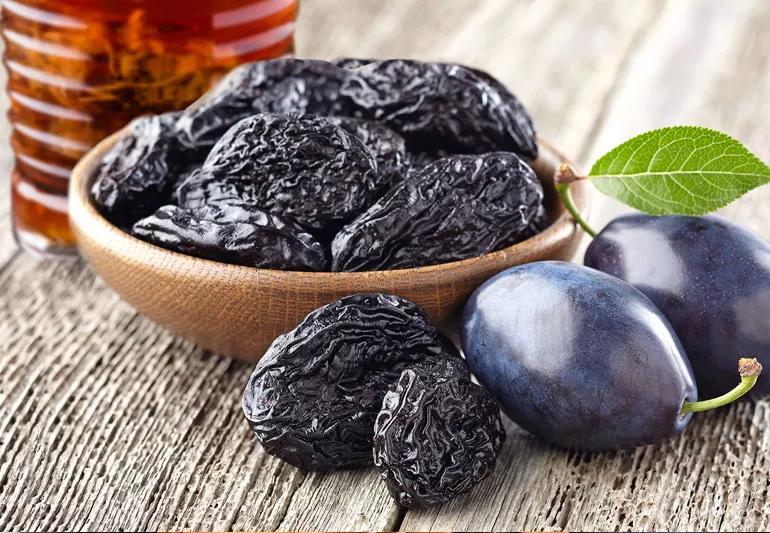Prunes earn the title of ‘nature’s remedy’ for bowel movement issues

Image content: This image is available to view online.
View image online (https://assets.clevelandclinic.org/transform/a6a71c65-af28-4354-b32a-ebcfc6cde556/prunes-Juice-Fruit-600154290-770x533-1_jpg)
A wooden bowl of prunes with prune juice in background and fresh plum in the foreground.
A visit to your grocery store’s juice aisle may be all that’s needed to find relief from constipation.
Advertisement
Cleveland Clinic is a non-profit academic medical center. Advertising on our site helps support our mission. We do not endorse non-Cleveland Clinic products or services. Policy
Prune juice almost holds legendary status when it comes to making people poop. Many consider it nature’s #1 remedy for going #2. To learn why, let’s turn to gastroenterologist Samita Garg, MD.
There’s little question that the tart-and-tangy purple elixir known as prune juice can flush people out. Study after study makes that point. (Check out this research that found prune juice “significantly increased” pooping.)
The way prune juice relieves constipation isn’t some magical cause-and-effect, either. It’s biological science.
Prune juice is loaded with sorbitol, a carbohydrate and sugar alcohol found in many different fruits, notes Dr. Garg. That list of fruits includes plums, including varieties that are dried out and turned into prunes.
Sorbitol helps you win the battle against constipation by drawing water into your colon. This moisture offers a laxative effect while softening hard and lumpy stool that’s plugging up your system.
Prune juice also is high in fiber, which works to better regulate bowel movements and move poop through your intestines a little more quickly.
In fact, research shows that prune juice appears more effective than psyllium (a fiber laxative used in many over-the-counter medicines) when it comes to improving stool frequency and consistency.
Advertisement
Prune-powered constipation relief doesn’t just flow out of a glass. Eating dried prunes can provide the same effect. One study even concluded that dried prunes “should be considered as a first-line therapy” for mild to moderate constipation.
Compared to prune juice, dried prunes offer:
Bottom line: Either prune juice or dried prunes can make you poop. Dr. Garg’s advice? “I always prefer the actual fruit over the juice given the higher fiber content, which is good for your GI tract.”
In addition, the sugar and calories in prune juice can be a concern if the drink is consumed in large quantities. Registered dietitians often compare the sugar content in 100% fruit juice to what’s in soda.
Prunes offer far more than gastrointestinal goodness. The fruit also is a good source of body-boosting antioxidants and the following vitamins and nutrients:
The notion that you can have “too much” of a good thing applies to prune juice.
If you’re trying prune juice for the first time, the general recommendation is for adults to start with a half-cup (4-ounce) serving in the morning. (Research shows that drinking as little as 2 ounces of prune juice a day can increase bowel movements.)
A second half-cup serving at night before bedtime might be worth trying if your system responds well. (Five dried prunes is the rough equivalent of a half-cup of juice.)
For younger children, cut the amounts in half to address constipation.
“Start slow,” advises Dr. Garg. “It’s best to start with just a few prunes or a small drink and see how it goes.”
And if you overdo it on prune juice or prunes, you’ll know it pretty quickly. It can lead to:
If you’re having trouble pooping, know that you’re not alone. It’s estimated that 16% of the world’s adult population — or about 1 out of 6 people — knows the discomfort of constipation. The issue typically becomes worse with age, too.
(How often people “go” varies from person to person, but having fewer than three bowel movements a week is considered the line for being constipated.)
Prune juice is one of many at-home remedies for constipation that can offer the desired laxative effect. Simple actions like a diet change, drinking enough water and reducing stress also may help you have more regular bowel movements.
Even something as simple as a morning cup of coffee can make a difference in your pooping habits. (The acids in coffee can give you the urge to go in just minutes!)
Advertisement
“There are many ways to address issues with constipation through your overall routine and diet,” says Dr. Garg. “Eating enough fiber, exercising, minimizing stress, getting enough sleep … these can all work to the benefit of your bowel movements.”
Talk with your doctor if constipation suddenly emerges as a new health issue or if you:
Advertisement

Sign up for our Health Essentials emails for expert guidance on nutrition, fitness, sleep, skin care and more.
Learn more about our editorial process.
Advertisement
Drinking water, eating high-fiber foods and exercising are just a few of the ways to get back to your ‘regular’ self
It might be, but it’s more likely that your symptoms of constipation and back pain are caused by underlying conditions
From staying hydrated to staying on schedule, these tips can help you stay regular on-the-go
Developed in the 1800s, this remedy remains a viable solution today
Stool softeners are a type of laxative that softens your stool, making it easier to poop
A dietitian weighs in on social media’s popular constipation recommendation
Eat foods high in fiber, drink water and consider using a laxative
It could be diet or it could be something else
Although it could be used as a moisturizer, this new trend is not recommended
Communicating clear limits helps protect your time, energy and emotional well-being
High cholesterol can be genetic, but testing and treatment can lower your heart disease risk